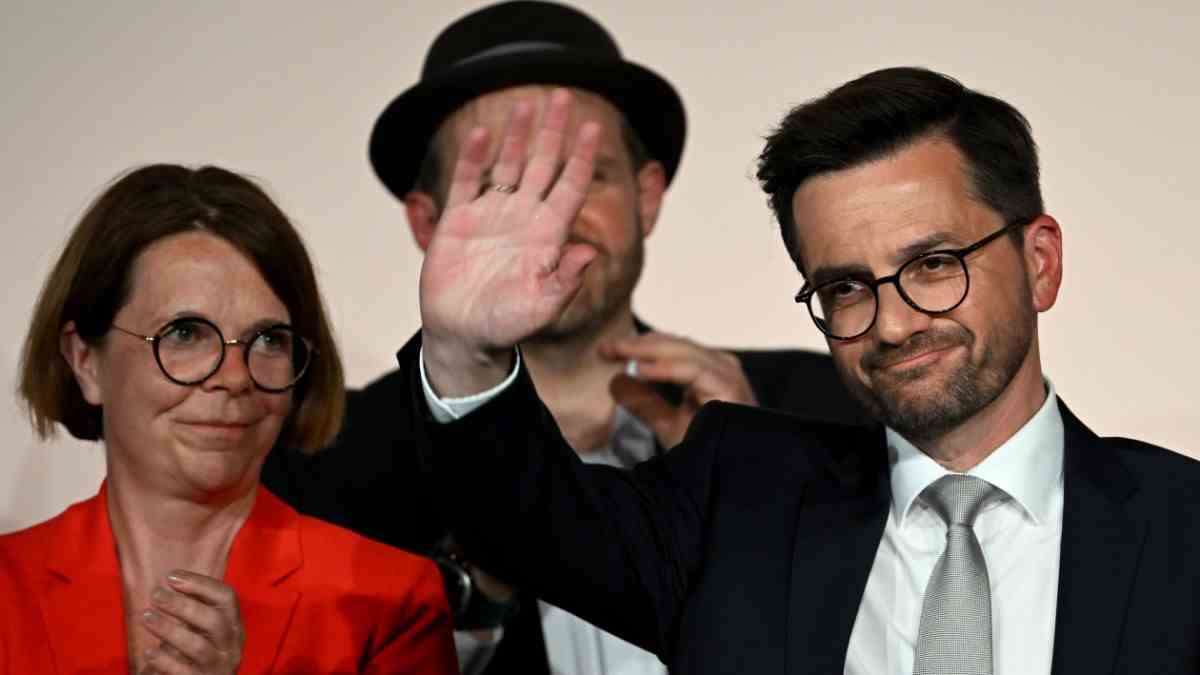Joy, jubilation and great happiness – that’s more likely elsewhere: not in the Rheinterrassen north of Düsseldorf’s old town, where the SPD is celebrating that evening. Or wanted to celebrate. It suddenly became terribly quiet when at 6 p.m. the first forecasts appeared on the big television monitors and the CDU’s black bar shot up: 35 percent, that’s a punch in the pit of the Social Democrats’ stomach. And it doesn’t get any better when the TV graphics miss the SPD: 28 percent is the end of the red line. A few comrades clapped defiantly.
A good half hour later, Thomas Kutschaty, the SPD’s top candidate, openly acknowledges that he is not a winner. He thanks the comrades for their applause, “that feels damn good on an evening like this, thanks for your encouragement.” The SPD wanted to become the strongest party in the country, Kuchaty has to congratulate others. “Congratulations to the CDU and the Greens.”
The SPD’s top candidate thus achieved the historically worst result of his party in the Rhine and Ruhr. Another disgrace: The 31.2 percent in the state election five years ago had already meant a minus record. The dawn dream of a resurgence of the SPD in North Rhine-Westphalia – this utopia has been shattered.
The other place on this Sunday evening is the Apollo Theater under Düsseldorf’s Rheinkniebrücke. Joy, jubilation, happiness – that’s what the NRW-Greens live out, where otherwise variety shows are cultivated. They were enchanted by sober numbers: 18, maybe even 18.5 percent – that’s three times the result of 2017 (6.4 percent).
It is the historically best NRW result for the Greens
Mona Neubaur, the 44-year-old top candidate, stares in amazement at the first forecasts. For a few seconds she crosses both hands in front of her throat as if she couldn’t breathe anymore. Then they hug party friends. The woman, who is now being traded as a super minister, says: “This is a huge job for us.” She also made a little history, with the Greens’ historically best NRW result.
This means that the former eco-party is now clearly the third power on the Rhine. Without them, since a grand coalition of SPD and CDU is considered impossible in North Rhine-Westphalia, it will not be possible to form a new government. You have to decide: black-green or red-green?
Despite the almost disastrous defeat of the SPD, Kuchaty had not given up in the early evening. Red-green will be scarce, maybe mathematically impossible – but then there would still be a traffic light option: “Social Democracy is also ready for a state government.”
Three, a maximum of four points should gape between Wüst and Kuchaty – otherwise red-green would be done, green strategists had predicted before the election. Now it’s seven or eight points. In the evening, Neubaur initially did not comment on coalition speculation, but shortly before the election she had signaled that she would prefer a two-party alliance to a three-party coalition, i.e. the traffic light. So: Advantage Black-Green.
Who knows if black and green will succeed?
The Greens want to negotiate confidently. Shortly before the election, they had presented a “government program” that the CDU expected to do all sorts of things: The previous minimum distances for wind turbines should fall, and solar cells should be on every new roof. Some demands read like excerpts from earlier red-green papers: stricter tenant protection, a package for more money against child poverty, lowering the voting age to 16.
In education policy, too, Greens are traditionally closer to the Reds than to the Blacks. This is one of the reasons why Kuchaty still hopes to come second in the election and end up first in the country. Who knows if black and green will succeed? In that case, the SPD man would quickly dispel his recently expressed doubts about a precise exit from coal in NRW 2030. He knows that that annoyed the Greens.
The decisive coalition word will probably have the basis with the Greens. For many years, the national association was considered more to the left. Is that still true? After the number of NRW members has more than doubled from 12,000 to 27,000 since 2017, nobody knows the basis exactly. Not even their own party leadership.

